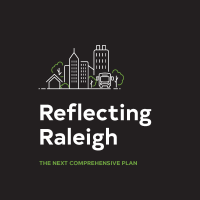Reflecting Raleigh: Stormwater Management and Priorities
Reflecting Raleigh: Stormwater Management and Priorities
Raleigh Community Stormwater Survey
The Comprehensive Plan is a long-range policy document that outlines a vision for how Raleigh will look and feel in the future, and how the city should grow to achieve that vision. This plan will take about 2.5 years to create and will provide policy guidance through the year 2050.
We are spending the first year of the planning process collecting ideas from you to determine what we should focus on in the future. This survey focuses on stormwater in Raleigh. Feedback you provide on this survey and during the event will help shape the vision and goals of Raleigh’s Next Comprehensive Plan.
Similar questions were provided during the city’s stormwater community conversation on December 4 and December 9, 2024. If you participated in the events but would like to share additional information, please feel free to take this survey.
Definitions
Flooding: When stormwater submerges yards, roads, and homes. Flooding happens when creeks and pipes cannot handle the amount of rain falling during a storm. Some flooding is natural and cannot be prevented. Other flooding can be prevented by building new infrastructure.
Stream Erosion: When the power of the stream flow causes sediment to be dislodged, resulting in steep banks and channel widening. Some erosion is natural, but rapid stream erosion happens as a result of increased runoff from urbanization.
Aging Infrastructure: Pipes, culverts or drains that need to be repaired/replaced because they are in poor condition and/or are near the end of their lifespan.
Pollution: Water pollution happens when stormwater picks up dirt, oil, fertilizer, trash and other litter. When it rains, this pollution goes into storm drains that lead to creeks.

